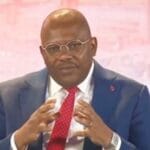… says, “Mass metering, technology-driven solutions, decentralization underway to strengthen grid”
Oredola Adeola
The Special Adviser to President Bola Ahmed Tinubu on Energy highlighted this during a recent virtual interview with the African Association of Energy Journalists and Publishers (AJERAP).
“This level of criminality speaks to how insecure the situation is for Nigerians; the lack of economic activity, increased poverty, and hardship are forcing people to risk their lives by dismantling towers,” she stated.
“While these actions can be seen as consequences of ongoing reforms, they are not an excuse for engaging in criminal activity that disrupts homes, businesses, and productivity,” she noted.
To combat these challenges, Verheijen noted that the government is implementing the Electricity Act, which supports decentralizing the energy sector.
“This approach aims to position generation, transmission, and distribution closer to areas of consumption and regions with the capacity to pay for electricity.
“By doing so, the government hopes to create a more resilient and responsive energy system that meets the needs of all Nigerians.
“Our grid currently needs to be developed to ensure that a disruption in the Niger Delta does not lead to blackouts in the North,” she stated.
Verheijen emphasized that initiatives such as the Electricity Act and the Rural Electrification Agency (REA) are critical components of the decentralization effort.
“These initiatives are all aimed at ensuring that the grid becomes a lot more stable,” she explained.
She also highlighted the integration of smart technology, mass metering and decentralization efforts as key components of the plan to enhance energy access and promote economic stability.
“The ambitious Presidential Metering Initiative, which seeks to deploy 7 million meters over the next three years, aims to close the 60% metering gap and reduce losses in the power sector.
“We believe reducing power sector debt is crucial to unlocking additional capital for both generation and distribution.
“We need to ensure that our grid is much smarter and better able to balance demand and supply,” she stated,
Verheijen pointed out that simply investing in more infrastructure without effective management and monitoring tools is insufficient.
“We need to understand where the demand is and how to meet it without disrupting the frequencies or facing the challenges that currently hinder reliable electricity delivery.”
“It’s about deploying technology solutions rather than just focusing on additional investment in hardcore infrastructure, ” she explained.
Verheijen also expressed optimism about the potential for reforms to instill confidence, particularly as residents in areas classified as Band A are beginning to experience reliable and affordable power.
“Our focus is on unlocking capital to support power generation and distribution, addressing affordability, and gradually building trust with customers.
“Energy access has a cost, and reliable electricity can only be achieved if we’re willing to invest, and users are willing to pay cost-reflective tariff. Many Nigerians have lost trust in the power sector, and that’s understandable.
“We’re addressing this issue by working with customers who can pay for reliable service—like Band A customers, who receive around 20 hours of electricity daily.
“They’re paying a market price that’s often cheaper than running diesel generators.
“This story needs to be told, as it builds confidence in the reforms we’re making, especially when it’s evident that people in Band A are getting reliable, affordable power.
“If more Nigerians see this, they’ll believe in the sector’s potential. Building trust is essential for scaling these reforms to other bands, increasing metering, and ultimately, expanding access.
Verheijen therefore called on the media to tell the story of criminality that must end, in order to enable businesses can have reliable access to electricity without disruption from criminal elements that continue to vandalize our infrastructure. We need to call it out and speak about it.
“We all have a role to play in shifting the narrative. Nigeria has immense potential, yet there’s a gap between where we are and where we should be. While policymakers need to be accountable, solving this problem requires collective effort.
“The media’s role is vital. While it’s important to hold policymakers accountable, there’s also a responsibility to tell the full story,” she said.




